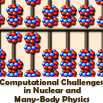Speaker
Prof.
Gerardo Ortiz
(Department of Physics, Indiana University, Bloomington)
Description
In this talk I present a theoretical framework and a computational method to study
the coexistence and competition of thermodynamic phases, and excitations, in
strongly correlated quantum Hamiltonian systems. The general framework is known as
Hierarchical Mean-Field Theory (HMFT), and its essence revolves around the concept
of the relevant elementary degree of freedom (EDOF), e.g., a spin cluster, utilized
to build up the system. The system Hamiltonian is then rewritten in terms
of these coarse-grained variables and a mean-field (Lie-algebraic) approximation
is performed to compute properties of the system. Thus, the (generally) exponentially
hard problem of determining, for instance, the ground state of the system is reduced
to a polynomially complex one. At the same time, essential quantum correlations,
which drive the physics of the problem, are captured by this local representation.
Provided the EDOF is chosen properly, even a simple single mean-field approximation,
performed on this EDOF, will yield the correct and complete phase diagram, including
its phase transition boundaries, {\it in a single computation}. The HMFT predictive
power stems from the simple fact that a {\it single} class of states, determined by the
EDOF, is used to establish the entire phase diagram of the system. I will describe
the zero and finite temperature formulations of the HMFT, and illustrate the
plethora of systems where the method has been successfully applied. Examples include
frustrated spin systems with exotic magnetic phases, including chiral ones,
ring-exchange hard-core boson models, and multiferroics.
Author
Prof.
Gerardo Ortiz
(Department of Physics, Indiana University, Bloomington)

